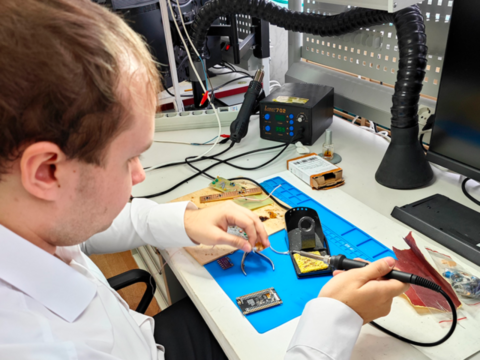In the Electronics FabLab, creative research teams of students implement their technical ideas under the guidance of experienced mentors – Head of the laboratory N. Gudayev and teachers of the Department of Radio Electronics and Communication Systems.
One of such teams, which includes students D. Deev and V. Chernikov, is engaged in research within the frameworks of the applied research work on the "Block for Determining the Spatial Location of Quadrocopters". The head of the mini-group, postgraduate student Stanislav Lysov, works directly with the students. The overall management of the project is carried out by Associate Professor of the Department of Radio Electronics and Communication Systems Nikolai Dudarev.
As part of the project, an algorithm and a model of the operation of the main computer centre module have been developed, which allows positioning of an unmanned object at the landing stage. Today, it is already possible to position an object, that is, determine its location and its angular positions (tilt relative to the landing zone).
Students in the Electronics FabLab are working on a model of a device that is a mixed object, partially located on an unmanned aerial vehicle (these are radio beacons). In addition, the project implies the presence of a ground supplement in the landing zone. This is directly the receiver, located at the processing periphery (at the conditional computer). The project also implies an additional radio beacon, which connects the entire system with specific coordinates on the ground, that is, accurately determines the location of the device (location relative to the landing zone).
Advantages of the technology
The technology for determining the spatial location of quadcopters can be applied to various types of drones: both standard atmospheric drones and rocket carriers. This technology is a multi-purpose one!
In addition, the technology is relevant in terms of automated landing of both drones and any unmanned objects, including missiles.
This system is very cost-effective, especially in comparison with the radio beacon landing system, which costs hundreds of millions of roubles.
The technology for determining the spatial location of quadcopters does not require large radars, and in general it requires an order of less funding. The team is currently looking for an industrial partner so that the project can be put to practical use in the near future.
Role of students in the project
“Students from the Department of Radio Electronics and Communication Systems, majoring in 11.03.03 Design and Technology of Electronic Equipment, are participating in the project. First-year students are the ones involved in the work. We decided to immerse the students in real practical tasks from the very beginning in order to motivate them in terms of their studies. The students already in their first year should understand and feel the processes they will have to work with in the future,” emphasizes Nikolay Dudarev. “Of course, older students also work in the laboratory, but the emphasis today is on involving first-year students in practice, introducing them to science and experiments from their first semester at the university. At the same time, the students work in the Asteroid Youth Design Bureau of the Institute of Engineering and Technology. This Bureau is working on preparing scientific publications. We already have joint publications with first-year students based on the results of our developments. In addition to having their first publication, the students gain important experience in defending their project at a conference.”
In addition, in the FabLab itself, the students are immersed in a real engineering environment. The atmosphere of the FabLab (equipment, training in working with engineering programs) motivates students to do real work, and not just theorize. In the process of subject training, the students themselves already understand why they need certain skills and knowledge, and learn to apply them in practice.
Initially, the idea for a student project within the frameworks of the Electronics FabLab was born based on the topic of the State Assignment FENU-2024-0004 "Research, Development and Creation of Demonstrators of Technologies of a Single-stage Reusable Launch Vehicle for Vertical Takeoff and Landing".
The Electronics FabLab was opened at the university in 2021, with financial support from the Priority 2030 program. The laboratory operates at the premises of the School of Electronic Engineering and Computer Science.




